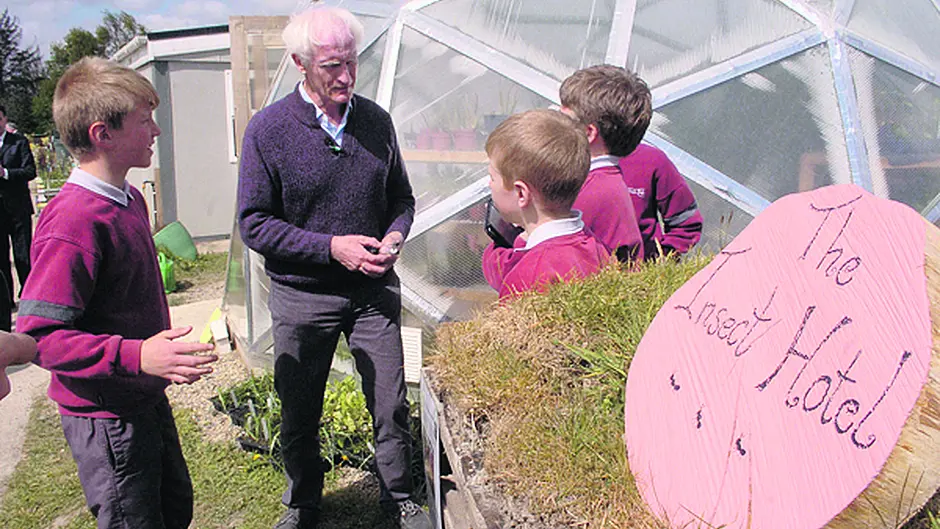Granting planning permission for one-off houses in the countryside, for non-farming householders, located far from their place of work, school, shopping and public transport, isn't responsible planning behaviour today.
GRANTING planning permission for one-off houses in the countryside, for non-farming householders, located far from their place of work, school, shopping and public transport, isn’t responsible planning behaviour today, when we consider we’re the laggards of Europe when it comes to our response to climate change.
Neither is living in extra-large poorly insulated houses heated by fossil fuels like oil, coal, peat and gas and making single-occupancy car commuting journeys, according to leading architect, TV producer and climate change campaigner, Duncan Stewart, who is a regular visitor to West Cork.
‘What is needed, is for communities to seek, collaborate and strive for more sustainable enterprises and livelihoods in their local area, so that their commuting journeys are much shortened and where young people can have the confidence for developing their future in their local area.
‘This would entail finding new, 21st century ways of creating long-term livelihoods, that would enable our current cohort of young generation to settle down and raise their future family close to their roots.’
Among other things, he is calling for a ‘carrot and stick’ approach for policy measures by the government, to incentivise and get people on board with what he’s calling the essential behavioural changes to achieve the necessary new ‘societal paradigm’ by Ireland ‘transitioning’ to a sustainable, ‘zero-carbon, resource-efficient, fair, just and inclusive, circular economy.’
He feels our Climate Mitigation Strategy, recently introduced by the government, isn’t a strategy at all, it’s just platitudes.
‘For example, if we’re to rapidly wean off fossil fuel and switch to renewable energy sources, then the carbon tax will need to be raised much higher and the revenues generated should be ring-fenced and be spent locally, to fund incentives for sustainable solutions.
‘The money raised in West Cork should go back to West Cork to fund incentives for householders, small businesses, farmers and for investments infrastructure that will be needed in West Cork in ecologically sound solutions, initiatives, incentives and enterprises that will help secure new long-term livelihoods.’
Unless drastic changes are made we’re ‘headed for catastrophic levels of disaster and within this century,’ he predicted.
In the second of our three-part series on Climate Change, with Duncan we look at the big emission offenders – transport and building – and, most importantly, how we can improve in both areas.
TRANSPORT
Ireland’s population is the most widely dispersed of all the 28 EU members, so our movements are impeded and our current modal choices are very limited, while our transport is dominated by use of private cars with 80% of journeys here conducted in a car by a single person.
Transport here is exclusively dominated by use of diesel and petrol engines. Most of our rural roads are congested with heavy traffic and are unsafe for walkers or cyclists. Our carbon dioxide emissions from transport keep rising, where they urgently require to be dramatically reduced.
‘In my view, if we are to address climate change, we’ll all need to live near our work, or find alternative sustainable solutions for our transport,’ said Duncan.
‘The way we have allowed housing developments to sprawl out into the rural hinterland, means that most people who reside in rural areas now have to travel long-distances by car, as the current choices for public transport are not adequately provided.
‘Sprawling settlements are a fundamental and exceptionally difficult problem for Ireland. We need to carefully consider and correct this ever-creeping, cancerous, dilemma in a fair way, that won’t see rural Ireland further suffer, in a manner which would enable this damage to be contained or reversed,’ said Duncan.
Duncan acknowledges that it’s not economically viable to have effective public transport in rural areas because of our very low and sparse population densities, but he says there has to be a significant shift from the car to other means of mobility where at all possible.
‘We need to cut our car use down to one quarter by 2040, so this may entail having to penalise single occupancy car users, if Ireland is to play its fair effort-sharing part to avoid exceeding the +2 degree Celsius dangerous limit in global mean surface temperature increase within this century.
‘Journeys by car should be the last resort and not be regarded as the norm for our main means of transport. We really need to focus on sharing car journeys in rural Ireland and help people link up with each other through websites.’
He also suggested introducing shuttle and feeder buses. ‘People could drive to a local area and get picked up by a bus, it could even be a school bus, and brought to the local town, or to a transport hub with a free ‘Park & Ride’ facility that connects to buses or trains.
‘Electric cars should be used for shorter journeys, where we need to move away from diesel cars. In fact they are currently being heavily charged or outlawed from going into most European cities,’ he said.
As a keen cyclist himself, Duncan said for shorter journeys we need to start walking and cycling again and make our rural roads safe, to be shared by both forms of ‘active travel’, as a way to also achieve healthy exercise each day. Mind-sets need to change and we need to feel comfortable and safe again making 2km (20min) journeys on foot; and 5km or 15 minutes by bike.
‘As 60% of our population lives in rural Ireland, so our roads will have to be made much safer, to accommodate active travel. As most of our rural roads have limited road width to share in a safe way with traffic, we need to find ways to enable walkers and cyclists to travel short commuting journeys, instead of by car.’
The campaigner concluded: ‘Currently, it’s very unsafe for children to venture from the entrance gate of their dwellings, onto dangerous rural roads traversed by fast traffic, with winding blind bends and excessive 80km/k and 100km/h speed limits, so they typically have to be driven to school in a heavy one-ton metal tank.
‘In my opinion, traffic calming measures of 30(km/h) should be introduced on all approach stretches to towns and to schools from distances extending 1-2km, which would allow children to safely cycle to their schools.’








